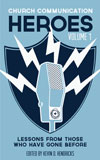How do we communicate the gospel in ways that truly reach the masses? For the answer, we need look no further than the great Frederick Douglass, famed speaker, writer and abolitionist, whose extraordinary life experience of being born into slavery and eventually gaining freedom shaped a unique but uncompromising perspective informing some of the most powerful oratory of the 19th century.
Douglass delivered the definitive speech of his lifetime, “The Meaning of July Fourth for the Negro,” before the president of the United States and other dignitaries during an Independence Day celebration July 5, 1852, nearly 11 years before the Emancipation Proclamation. All who witnessed the message were certainly challenged to at least assess, if not modify, their perspectives on liberty and justice. The memory of these most brutally honest words have endured for generations, arming church communicators with two powerful lessons for relevant, effective 21st century ministry.
Lesson #1: Confront Courageously
Douglass, in this speech, respectfully acknowledged the significance of the holiday, even giving a nod to the nation’s founders for exhibiting courage in fighting for what they believed in, leaving the comforts of home and starting anew in a land unfamiliar to them. His bone of contention, though, was the fact that these founders spoke of their own independence, signed the Declaration of Independence, and celebrated Independence Day, even though millions living in America at the time were neither free nor independent. These contrasting realities, to Douglass, marked the height of hypocrisy, to which he offered the following:
What, to the American slave, is your 4th of July? I answer; a day that reveals to him, more than all other days in the year, the gross injustice and cruelty to which he is the constant victim. To him, your celebration is a sham; your boasted liberty, an unholy license; your national greatness, swelling vanity; your sounds of rejoicing are empty and heartless; your denunciation of tyrants, brass fronted impudence; your shouts of liberty and equality, hollow mockery; your prayers and hymns, your sermons and thanksgivings, with all your religious parade and solemnity, are, to Him, mere bombast, fraud, deception, impiety, and hypocrisy—a thin veil to cover up crimes which would disgrace a nation of savages. There is not a nation on the earth guilty of practices more shocking and bloody than are the people of the United States, at this very hour.
As church communicators, the first lesson we derive from this speech is to have enough confidence in your message to courageously deliver it. Douglass was deeply convinced about his message and offered this candid perspective not to be disrespectful or confrontational toward the group he was addressing, but to implore the nation’s leaders, those responsible, at least in part, for perpetuation of slavery throughout the 19th century, to step outside of their comfort zones and consider others not like them, whose plight was the direct result of laws on the books at the time. To Douglass, it was impossible for an oppressed people to celebrate an independence they truly did not have. He didn’t have a problem sharing this most important point with anyone.
Lesson #2: Communicate Globally
Secondly, perhaps the more important message in this speech is that we must be ever cognizant of the vastly different and oftentimes diametrically opposed viewpoints of the world’s citizens. The body of Christ, as is the world as a whole, is beautifully diverse, so when crafting strategies and messages to communicate the gospel of Jesus Christ, we must remember we do not serve monolithic audiences that can be spoken to in canned ways.
As we arrive at each holiday in our year, we correctly follow the lead of Frederick Douglass by being more sensitive to the fact that all of us are not equally able to celebrate that holiday because experiences surrounding it may vary, due unfortunately to racial and/or socioeconomic differences.
The cross of Christ should unify us all, regardless of race, nationality or denomination, but our life experiences threaten that unity. As church communicators offering a Christ who died for the sin of the whole world, we must consider that diversity of experience and craft messages focusing more on the love of Jesus that unites us than the differences that separate us, so as to keep the focus on Christ and not on attacks to his bride.
Thank you, Frederick Douglass, for these most important lessons.
 More:
More:
- Read about more heroes in our ebook, Church Communication Heroes Volume 1: Lessons From Those Who Have Gone Before.
- Learn more by reading The Narrative of the Life of Frederick Douglass.
- Check out other heroes in our Church Communication Heroes series.




